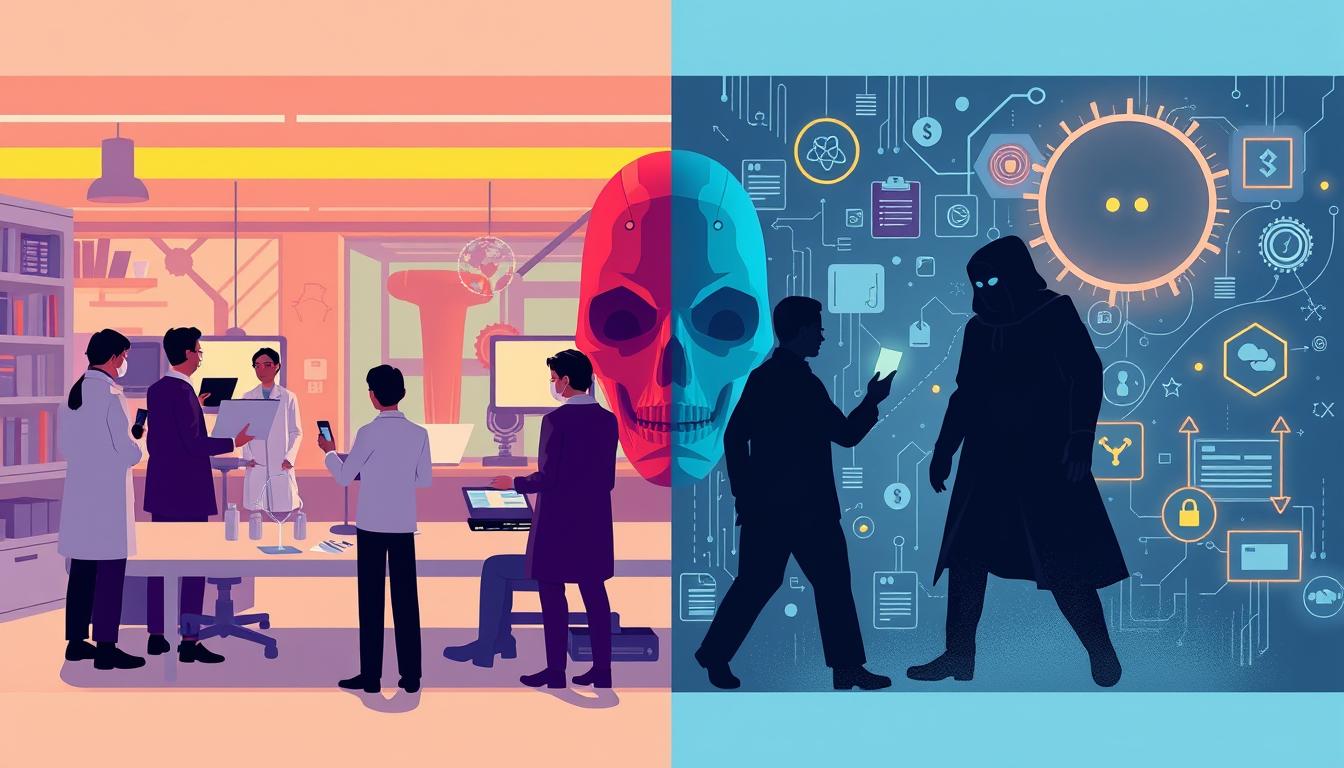From Innovation to Exploitation: The Ethical Dilemma of AI Apps Like DeepNude

Exploring artificial intelligence, you might find apps like DeepNude. They make us think about the line between progress and misuse. AI has brought big changes in many areas, but it also raises big questions about ethics.
Apps like DeepNude start a big talk about ethics in tech. As you learn more about AI, you’ll see different views on these apps. Some see the good they do, while others worry about the bad. It’s key to make sure AI apps are made and used with care for people’s rights.
The debate around AI apps like DeepNude is deep and complex. As you explore AI, you’ll have to think about the good and the bad. Understanding the ethics of AI apps helps us make sure they’re used right.
Key Takeaways
- The development of AI apps like DeepNude raises important ethical considerations.
- The balance between innovation and exploitation is crucial in AI development.
- AI apps can have far-reaching consequences, impacting individuals and society.
- Ethical considerations should guide the development and use of AI apps.
- The well-being and privacy of individuals must be prioritized in AI development.
- Responsible AI development and use are essential for mitigating the risks of exploitation.
Understanding the Evolution of AI Applications
Exploring artificial intelligence shows how ai apps change our lives. Deep learning technology lets machines learn and get better over time. This has led to many ai apps that alter how we live, work, and interact.
Artificial intelligence and deep learning have brought big changes. We now have virtual assistants and self-driving cars. These changes are seen in our daily lives, like using Siri or Alexa and navigation systems that learn routes.
The future of ai looks bright, with chances in healthcare, education, and helping the environment.
Some key areas where ai apps are making a big difference include:
- Virtual assistance: ai-powered virtual assistants help manage your schedule, send messages, and make calls.
- Image recognition: deep learning-based systems are used in self-driving cars and medical diagnosis.
- Natural language processing: ai apps improve language translation, sentiment analysis, and text summarization.
The growth of ai applications shows human creativity and innovation. As you delve deeper into artificial intelligence, you’ll find more ways ai apps are changing our lives and shaping tech’s future.
The DeepNude Phenomenon: A Case Study in AI Ethics
When you look into AI, you find DeepNude, a topic that brings up big questions about ai ethics. This example shows the ethical problems that come up when new tech is used the wrong way. The DeepNude app, which makes fake images with deep learning, has started a big debate. It makes us think about where to draw the line in AI and how it could affect us all.
Looking into DeepNude, we see many issues. There are worries about privacy, getting consent, and how it could be used badly. As a case study in AI ethics, DeepNude shows us how important it is for creators to think about the effects of their work. The app’s power to change images raises big questions about privacy and consent.
- The potential for misuse and exploitation
- The importance of prioritizing ai ethics in development
- The need for transparency and accountability in AI applications
By looking at DeepNude through the eyes of ai ethics, we learn more about the challenges of AI. It’s key to think about the effects of these technologies. And to understand the value of case studies like DeepNude in shaping ai ethics rules.
From Innovation to Exploitation: The Ethical Dilemma of AI Apps Like DeepNude
When we talk about AI apps, we must see the line between good and bad. DeepNude was meant to show AI’s power in changing images. But, its misuse has caused big ethical problems, showing we need to develop AI responsibly.
The shift from good to bad use comes from not having rules and being too easy to get. AI apps can be used wrongly, causing serious issues. This includes making and sharing explicit stuff without permission. It worries us about how AI misuse can hurt people and groups.
The Original Intent Behind the Technology
AI apps like DeepNude started as a way to explore new tech. But, as they grew, it was clear they could be used for good or bad. To stop bad use, we need clear rules and make sure developers focus on making AI right.
When Innovation Crosses Ethical Boundaries
When AI apps are used wrong, problems happen. For example, making and sharing explicit stuff without saying can hurt people’s feelings. We must see the dangers of AI apps and work to stop them being used badly.
The Social Impact of Misused AI
The wrong use of AI can hurt a lot, causing:
- Emotional pain and harm to people
- Damage to communities and relationships
- Less trust in AI
To lessen these problems, we must focus on making AI ethically. We need to make sure AI apps are made with care and thought. This way, we can use AI’s power without the risks of misuse.
Analyzing the Technical Architecture of Deep Learning Apps
Exploring artificial intelligence means learning about deep learning apps’ tech. Deep learning has changed AI app development. It lets apps learn from lots of data and get better with time. Their tech supports complex algorithms and big datasets, doing tasks humans thought were theirs alone.
The technical architecture of these apps has layers for data, processing, and output. It’s built to manage huge data amounts, training the app’s algorithms. AI apps with deep learning can do many things, like recognize images and speech, understand language, and predict outcomes.
Some key features of deep learning app tech include:
- Scalability: Handling big data and scaling up or down.
- Flexibility: Adapting to various data and algorithms.
- Performance: Processing data fast and efficiently.
Knowing about deep learning app tech helps us see their strengths and weaknesses. As AI grows, staying updated on deep learning and technical architecture is key. This way, we can fully use AI apps.
Privacy Concerns and Personal Rights in the AI Era
In the ai era, you face many privacy concerns that affect your personal rights. The growing use of artificial intelligence has brought big data protection challenges. Recent data breaches and privacy violations show we need strong measures to protect our consent and digital identity.
Some major privacy issues in the ai era include:
- Unauthorized data collection and processing
- Lack of transparency in ai decision-making processes
- Insufficient security measures to protect sensitive information
To tackle these issues, we must have and enforce strong data protection laws. This means using solid security steps, being clear about ai’s workings, and getting clear consent for data use. By focusing on privacy and personal rights, we can make the ai era safer and more trustworthy.
In conclusion, the ai era brings big privacy and personal rights challenges. But by recognizing these problems and finding solutions, we can protect our rights and make the digital world safer.
| Privacy Concerns | Personal Rights | Data Protection Measures |
|---|---|---|
| Unauthorized data collection | Right to digital identity | Robust security measures |
| Lack of transparency in ai decision-making | Right to individual consent | Transparent ai processes |
| Insufficient security measures | Right to data protection | Regular security audits |
The Role of Developers in Ethical AI Creation
As a developer, you have a big role in shaping AI’s future. Making ethical AI is complex and needs careful thought on data protection, transparency, and accountability. Ethical AI development is not just a moral duty but also a legal one in many places.
Developers must make sure their AI systems are ethical. This means being open about the data used and ensuring fairness and no bias. Creating AI that is both ethical and responsible is tough but vital for AI trust.
Some key principles for ethical AI creation include:
- Respect for human rights and dignity
- Transparency and explainability
- Fairness and non-discrimination
- Accountability and responsibility
By sticking to these principles, developers can make AI systems that are not just good but also ethical and responsible. The role of developers in ethical AI creation is crucial, needing a deep understanding of AI’s ethical side.

The table below summarizes some key considerations for ethical AI creation:
| Principle | Description |
|---|---|
| Respect for human rights | AI systems should respect human rights and dignity |
| Transparency | AI systems should be transparent and explainable |
| Fairness | AI systems should be fair and non-discriminatory |
By thinking about these principles and guidelines, developers can make AI systems that are ethical, responsible, and good for society.
Legal Frameworks and AI Application Regulation
Understanding the legal rules around AI is key to seeing its impact on our lives. Laws aim to handle the good and bad sides of AI. Yet, we need stronger laws to make sure AI is fair and open.
The ai regulation world is changing fast. New laws and rules are coming to tackle AI’s problems. For example, the European Union’s GDPR sets a high standard for legislative measures that protect people’s rights.
Some ideas for new rules include:
- Clear rules for making and using AI
- Strong tests to check AI works right
- AI must be clear and explainable
It’s important for countries to work together on AI laws. This way, they can share good ideas, solve common issues, and make AI rules more consistent.
The main aim of legislative measures is to find a balance. We want AI to help society, not harm it.
| Country | Legislative Measure | Purpose |
|---|---|---|
| United States | AI Regulatory Framework | Establish guidelines for AI development and deployment |
| European Union | GDPR | Protect individual data rights and privacy |
Balancing Innovation with Ethical Responsibility
When we look at the fast growth of AI, it’s key to find a balance between new ideas and doing the right thing. This balance helps make sure that tech growth doesn’t hurt people’s rights or the community’s health.
There are good examples of finding this balance. For example, AI in healthcare that keeps patient info safe while finding new treatments and diagnoses.
To get this balance right, we need to think about a few things:
- Clear AI development steps
- Strong testing and checking
- Keeping an eye on AI systems all the time
By focusing on innovation and ethical responsibility, we can make AI that helps us grow and keeps us safe from harm.
The Future of AI Development and Ethics
Thinking about AI’s role in our lives is key. The future of AI is changing fast, with new tech and ideas popping up daily. Ethics are crucial to make sure AI apps are used right.
New rules are being made to control AI use. These rules aim to make sure AI helps society, not harms it. For example, preventive measures like regular checks can spot and fix AI risks.

To trust AI apps, we need to be open and accountable. We should tell people how AI apps work and what data they take. Also, emerging guidelines set AI standards, building trust in these techs. Key steps to trust AI include:
- AI apps should be clear and explainable
- Give clear data use info
- Set AI development and use standards
By focusing on ethics and responsible AI, we can look forward to a bright AI future. As we move forward, think about how you can support ethical AI. You can help build trust in these technologies.
Stakeholder Perspectives on AI Ethics
When thinking about AI’s impact on society, it’s key to look at different views on AI ethics. The developer community is especially important in shaping AI’s future. Their opinions on AI ethics are very valuable. Surveys and interviews show a variety of concerns and ideas, showing the need for a broad approach to AI ethics.
Developers worry about being open in AI’s decision-making and being accountable in AI creation. The public is worried about AI’s risks, like losing jobs and AI bias. Experts say we need to keep talking and working together to make sure AI helps everyone.
Here’s what stakeholders think about AI ethics:
- Developer community: wants AI to be open and accountable
- Public opinion: fears AI’s risks, like job loss and bias
- Expert recommendations: push for ongoing talks and teamwork
In short, understanding different views on AI ethics is key to solving AI’s ethical problems. By listening to developers, the public, and experts, we can aim for a future where AI benefits everyone and values ethics.
| Stakeholder Group | Key Concerns | Recommendations |
|---|---|---|
| Developer Community | Transparency, accountability | Establish clear guidelines for AI development |
| Public | Job displacement, bias | Invest in education and retraining programs |
| Experts | Lack of dialogue, collaboration | Establish ongoing forums for stakeholder discussion |
The Path Forward: Solutions and Recommendations
When thinking about AI apps like DeepNude, we must consider the path forward and solutions. We need to develop strict guidelines for AI. This ensures these technologies are used responsibly and respect individual rights.
Some important recommendations for moving forward include:
- Implementing robust testing and validation procedures to ensure AI systems are fair and unbiased
- Establishing clear policies for data collection, storage, and use
- Providing transparency into AI decision-making processes
- Fostering ongoing dialogue between developers, policymakers, and the public to address emerging concerns
By working together, we can implement these solutions and follow a responsible path forward. This way, AI technologies can benefit society, while minimizing risks and negative consequences.
The ultimate goal is to use AI to enhance and support human life, not exploit or harm individuals. By focusing on ethics and responsibility in AI development, we can create a brighter, more equitable future for everyone.
| Recommendations | Benefits |
|---|---|
| Implement robust testing and validation | Ensures fairness and reduces bias in AI systems |
| Establish clear data policies | Protects individual rights and promotes transparency |
| Foster ongoing dialogue | Encourages collaboration and addresses emerging concerns |
Conclusion
As we wrap up our look at AI apps like DeepNude, it’s clear we need to focus on ethical responsibility in AI. The lessons from this case show we must keep talking and working together. This includes AI developers, policymakers, and the public to make sure AI helps everyone.
The promise of AI is huge, but we’ve seen its dark side with DeepNude. To move forward, we must put user privacy first and respect digital rights. This way, AI can grow in a way that’s both innovative and ethical.
We need to stay alert, talk openly, and be ready to change as AI changes. By working together and focusing on the good, we can make AI’s benefits bigger and its risks smaller. It’s up to all of us to keep AI’s ethics at the top of our list.
